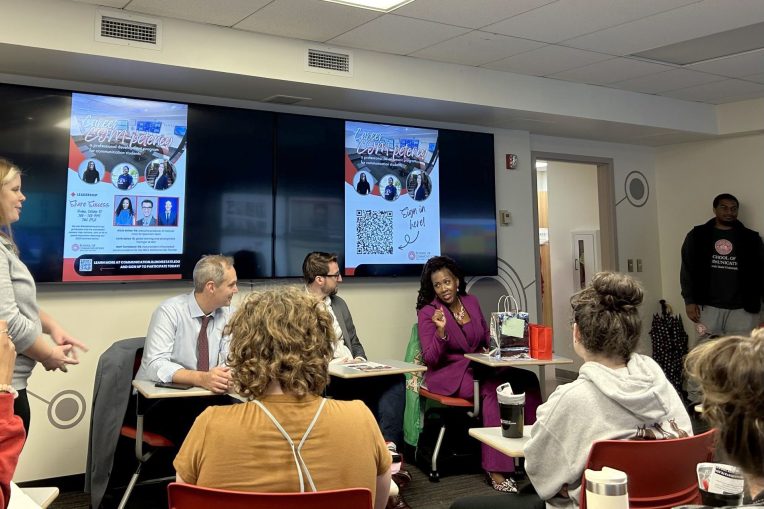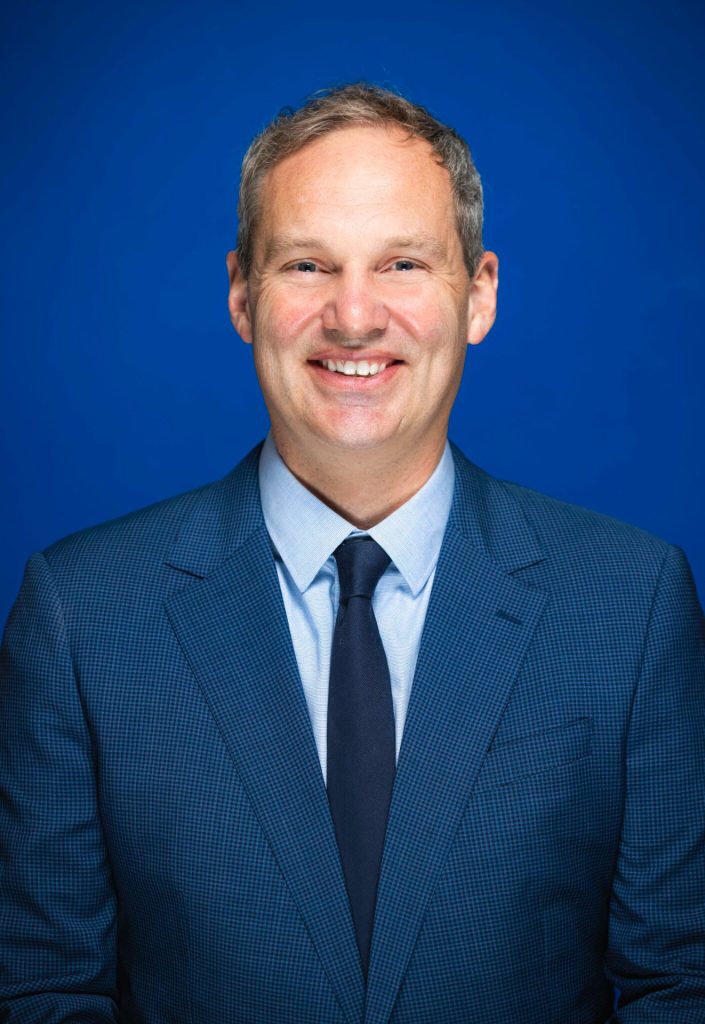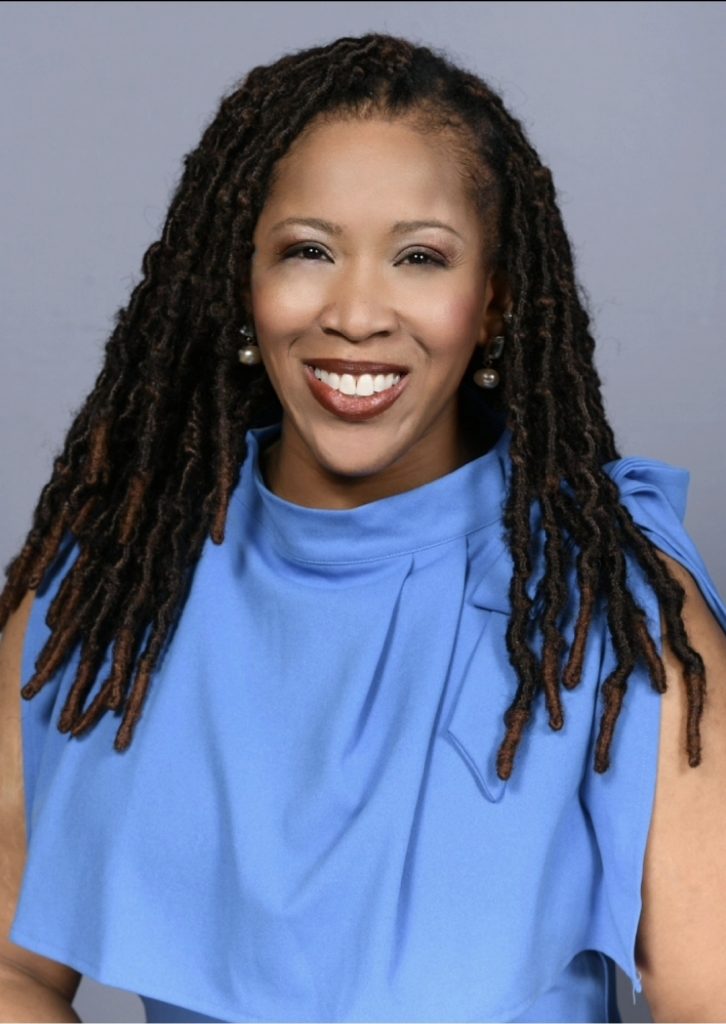Three accomplished School of Communication alumni returned to campus Homecoming weekend to share their personal stories and career insights during the Share Your Success Leadership Panel.
Hosted by the School of Communication’s new Career COM-petency program, the panel included: Alicia Bettes ’94, an executive producer of national news for Spectrum News, Chris Saksa ’16, a global learning and development manager at Aon, and Matt Tumbleson ’04, the vice president of basketball communications for the NBA’s Oklahoma City Thunder.
More than 40 students, faculty, and staff crowded into a Fell Hall classroom on October 13, to hear Bettes, Saksa, and Tumbleson answer questions and provide advice about preparing for job interviews, becoming a leader, growing professionally, and more.
Nailing a job interview
Tumbleson said preparing for a job interview is key. Being prepared allowed him to be his authentic self during his interview, which he said is an important quality to bring to any job.
“I had prepared for where the conversation could potentially go, all the different possible angles, and then the conversation became very authentic,” Tumbleson said. “But it was because I was prepared to navigate it to where it needed to go.”
Saksa talked about the importance of storytelling during an interview—having a story prepared for each interview question and giving the interviewer specific, personal examples.
“One of the biggest things that I learned here at ISU was that when you’re going through a job description and applying for your first job, you should go through and pick all the main points out of there and say, ‘I have a story about this,’” Saksa said. “So, when they asked me, ‘Tell me about a time when you had to develop curriculum for somebody?’ Or, ‘Can you tell me about how you would navigate this situation?’ I’d be like, ‘I have a story for you.’”
Bettes stressed the importance of researching the hiring company and the interviewer or hiring manager ahead of time.
“When you go into an interview for a job, whatever job that you’re going into, know your subject,” Bettes said. “Before I start telling my story, I want to know who I’m talking to. In an interview situation, if I know I’m speaking to Mary Adams, vice president of ‘XYZ corporation,’ I’m looking her up on LinkedIn. I’m Googling her to find out a little bit about her background. It just speaks volumes to who you are and your dedication and commitment to whatever the role is that you’re interviewing for.”
Becoming an effective leader
The panelists also discussed what it means to be a leader, and more specifically, what it means to lead effectively.
Bettes said it is a privilege to become an entrusted leader. “I also believe that everyone has leadership qualities inside of them,” Bettes said. “Whether it’s at a corporation, whether it’s at home, whether it’s at school, church, you name it—you all have the ability to step out and take the lead in whatever you do. So, leaders are workers and workers are leaders. Leadership is people.”
Top-down management isn’t necessarily the most effective leadership method, according to Saksa. “I actually think it’s flipped,” Saksa said. “I report to the people that report to me, and it is my responsibility that they show up every single day and they can be their authentic self and reach their full potential. If I’m going to be a good leader, I have to put them first and make sure that they’re successful. So, I think if you identify what your values are, what your competencies are, and where your areas of strengths and weakness are, then you can better serve the people.”
To students who will soon be entering the workforce, Tumbleson encouraged them to “work hard to find themselves.”
“Try to work hard to understand yourself and develop confidence in yourself,” Tumbleson said. “And to the point on leadership, this helps with being a leader too, because you’re not trying to be something you’re not; you’re the same to your group and to your team.”
The panelists further discussed the importance of identifying qualities of effective leaders and combining them to create a personal leadership style.
Advancing in a career
The panelists agreed that they felt prepared for their careers after graduating from Illinois State. They credited helpful staff and professors, registered student organizations, and other campus resources. They encouraged students to take advantage of opportunities on campus and carry what they learn at Illinois State into their careers.
“My advice is to never stop learning,” Saksa said. “The slogan at ISU is ‘Gladly we learn and teach.’ Notice that the word ‘learn’ comes first. So, my biggest piece of advice to all of you is just never stop learning. Never stop stepping out of your comfort zone. Whether it’s a giant step or whether it’s a small step.”
Bettes encouraged students to continue pursuing their passions in their careers and beyond. “You have this degree? Yes, pursue whatever that degree is. But if there’s somewhere along the way, something else interests you, don’t be afraid to step out,” Bettes said. “That’s how you grow.”
The panelists reminisced about some of their favorite professors and how they’ve kept in contact after graduation. They said it’s important to build relationships with faculty and utilize them as a resource.
The new Career COM-petency program
The Share Your Success Leadership Panel was the second of eight Career COM-petency workshops planned this academic year. The program was developed to replace the long-standing COM Week model for professional development opportunities in the School of Communication.




